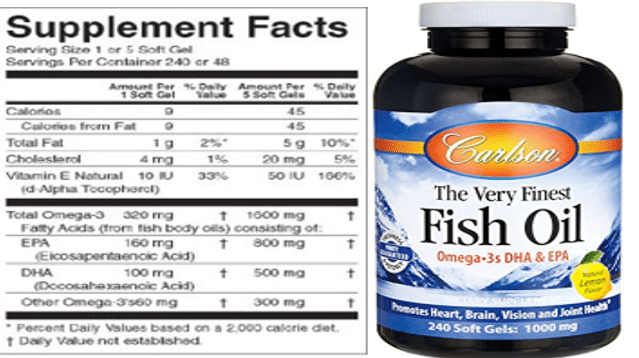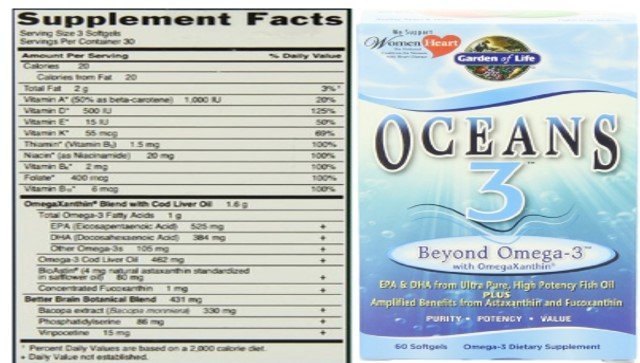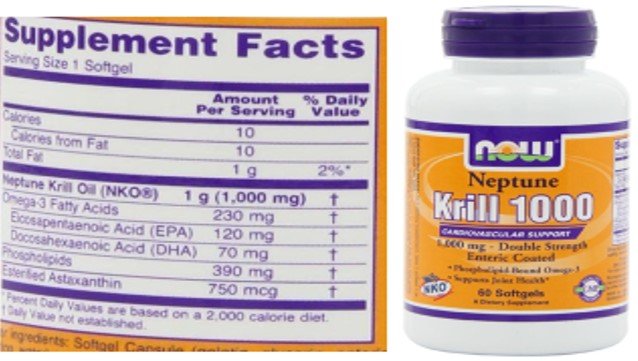Krill oil vs Fish oil which is better?
The krill oil vs fish oil which is better debate is ongoing and there's no clear answer on which one is the better omega-3 supplement and what makes krill oil and fish oil potent and effective omega-3 supplements.
There is so much confusion and controversy around the krill/fish oil industry, it's almost impossible to make your mind up and who to believe in regards to the effectiveness, potency, and efficacy of krill oil and fish oil supplements.
There are two sides; One side believes that there's no doubt that krill/fish oil omega-3 fatty acids are superfoods and have been proven to help with so many health issues and they are very safe for everyone to consume.
The other side believes there's absolutely no evidence whatsoever that krill/fish oil is effective against heart diseases or inflammation or any other diseases.
Fish oil and krill oil popularity
Fish and krill oils are by far the most popular animal derived omega-3 supplements on the market today. 7.8% of adult Americans (18.8 million) used fish oil/omega-3 supplements in 2012 which is about 8 million more adults than in 2007.
Fish oil/omega-3 was also most popular among children in the U.S., where around 270,000 more children used fish oil/omega-3 supplements in 2012 than in 2007.
Fish oil/krill oil and the omega-3 emergence
The reason why krill and fish oil omega-3s are one of the most sought after supplement is the rapid rise of many health illnesses and the failure of the pharmaceutical drugs to effectively treat life-threatening diseases like heart problems, inflammations, mental disorders and the list goes on.
Heart disease is the number one cause of death in the U.S., killing around 787,000 Americans in 2011. More people dying from heart disease than all forms of cancer combined.
Coronary disease alone claims nearly 380,000 lives a year in the U.S.
What about inflammation disorders?
Over 50 million adults in the U.S. are diagnosed with some type of arthritis, rheumatoid arthritis, and fibromyalgia etc.
Around 22% of adults in the U.S. are diagnosed with arthritis and this is not the end of it. It has been estimated that 67 million Americans 18 years and older will have arthritis by 2030.
These overwhelming statistics are one of the reasons why krill oil and fish oil became one of the most popular cardiovascular and arthritis supplements around.
In 2009, Public library of science medicine journal published a Harvard study concluded that omega-3 deficiency claims nearly 96,000 American lives annually.
Omega-3/Omega-6 ratio and why it's important
The fact is that there are so many people deficient in omega-3 fatty acids and that because of:
1) our body can't synthesize omega-3 fatty acids
2)most of us lead unhealthy and imbalanced lifestyle making it almost impossible for our body to balance the omega-3:6 ratio, and also most of the foods we eat are rich in omega-6, and that also imbalances the omega 3:6 ratio.
According to the center of genetics in Washington, in a typical western diet, the 3:6 omega fatty acids ratio is around 15:1, which can lead to many diseases like heart disease, inflammation, cancer, and autoimmune diseases.
Lowering the omega-3:6 ratio has been shown to lower the risk of many chronic diseases like cardiovascular disease, rheumatoid arthritis, breast and colorectal cancers, and asthma.
What's the difference between krill oil and fish oil?
Fish oil
Fish oil supplements are made and extracted from anchovies, sardines, mackerel, salmon, and tuna. The fish itself doesn't produce omega-3 fatty acids but instead obtains them by eating microalgae and prey fish.
Fish oil consists of EPA (eicosapentaenoic acid) and DHA (docosahexaenoic acid) fatty acids.
EPA and DHA fatty acids in fish oil are available in triglycerides and ethyl ester forms. Triglycerides and ethyl ester are not water-soluble, which means they need digestive enzymes to break them down so our body can absorb them easily.
This makes fish oil less bioavailable than krill oil because of its triglyceride and ethyl ester forms. But that doesn't mean fish oil doesn't get absorbed, it just takes a longer time.
It's important to note that EPA and DHA quantity in fish oil is greater than those in krill oil.
Fish oil and science
There are countless studies that were done on fish oil to evaluate its effectiveness against many disorders and diseases like cholesterol, inflammation, diabetes, depression etc.
Multiple studies have proven that fish oil can effectively reduce triglyceride levels in the blood, which can greatly help in reducing the risk of heart disease.
A study was carried out to evaluate the effects of fish oil on depression. The results suggest that EPA fatty acids can have positive effects on individuals that are suffering from depression.
Another study found that supplementing fish oil to obese subjects helped to reduce inflammation.
The fourth study I would like to mention was carried out to determine the effects of fish oil on obese young adults with high blood pressure. The conclusion was that fish oil managed to reduce their blood pressure considerably.
Despite there are so many studies done on fish oil to prove its effectiveness. It's important to remember that the results of these studies were not conclusive and more extensive trials needed to be done to confirm these results.
That's why you see so many research scientists don't fully agree with these results. There seems to be a tag of war between different parties on whether fish oil is actually potent and effective or not?
The downside to fish oil (and krill oil)
What most of us seem not to like about fish oil supplements is that the pill is big and hard to swallow, and the fact that most of the fish oil supplements are either have a fish odor or causes fishy burps or both.
There are so many companies around the world claim that they produce the best fish oil supplements on the market, and that is simply not true.
The biggest challenge the krill oil and fish oil companies face is OXIDATION.
The problem with krill oil and fish oil is that they oxidize really fast. Because of the oxidation process, it's important to remember that not all krill oil and fish oil supplements are created equally.
The fishy odor or fishy burps indicate that the fish oil supplement you have is oxidized or went through too much oxidation and it's not a high-quality krill/fish oil supplement.
The oxidation process will happen no matter what. The challenge is to minimize the oxidation process so that the active ingredients in fish oil supplement are protected and not damaged.
Working as a health food store manager, I can assure you that there are so many high and low-quality fish oil and krill oil supplements and it's our job to do our research to make sure we are getting high-quality krill oil and fish oil supplement.
Krill oil
Krill oil is made from krill antarctic, Euphausia Superba. Krill oil has a complex phospholipid composition and contains long-chained unsaturated fatty acids.
Krill oil contains two types of EPA and DHA fatty acids:
- Triglycerides Fatty acids, which are similar to fish oil fatty acids,
- Phospholipid-derived fatty acids
Phospholipid-derived fatty acids are readily bioavailable and don't need digestive enzymes like triglycerides. That makes krill oil superior in its bioavailability to fish oil.
BUT,
This is not the whole story about krill oil bioavailability.
Gunilla Traberg from Norwegian company Epax AS, argues that just over 40% of krill oil is phospholipid-derived fatty acids, and the rest is in triglyceride form.
This means just over 40% of fatty acids in krill oil is more bioavailable than those in fish oil. And the rest of it is absorbed in a similar manner to fish oil.
Gunilla Traberg also added that the total EPA and DHA in krill oil is around 100mg/g to 350mg/g, while total EPA and DHA in fish oil ranges between 500mg/g to 700mg/g, and fish oil is relatively cheaper than krill oil.
This is another major factor in deciding whether the higher bioavailability of krill oil is worth it or not?
The other thing to consider is that krill oil contains ASTAXANTHIN and CHOLINE
What's Astaxanthin?
Astaxanthin is an anti-inflammatory and antioxidant that is found primarily in marine organisms like krill, shrimp, salmon, and microalgae.
It has been claimed that Astaxanthin can help with so many health disorders:
- Heart problems
- Rheumatoid arthritis
- Aging
- Carpal tunnel syndrome
- Cataracts
- Alzheimer's disease
- Parkinson's disease
- Blood glucose
There are numerous small studies have been carried out to examine the effects of Astaxanthin.
Blood glucose study has been carried out to determine the positive effects of astaxanthin. In a 4-week study, astaxanthin appeared to increase blood flow to the eyes without any side effects.
In another study, astaxanthin was determined to have positive effects on oxidative stress and cholesterol in overweight subjects.
There were 34.5% increase in the antioxidant count in the blood, and 32.7% reduction in lipid peroxidation (damages cell membrane and can cause cancer), around 10% reduction in LDL cholesterol (bad cholesterol), and also 30% increase in superoxide dismutase, which is a powerful anti-inflammatory.
There's no doubt that larger studies needed to be done to confirm the effectiveness of astaxanthin. But, these studies prove that astaxanthin is an antioxidant and anti-inflammatory that can be very useful and effective.
What's choline?
Choline is a compound that has cognitive properties and essential for liver function. The choline that is in krill oil is present in a form of phosphatidylcholine.
Krill oil contains around 69 choline-containing phospholipids, according to an experiment that was carried out to detect that amount choline in krill oil. They found out that the Phosphotidylcholine concentration was ~34g/100g oil.
This shows that choline has an important part to play in making krill oil as potent and effective as it has been shown to be.
But again, there is a long way to go and more studies needed to be done to actually know what's the actual role of choline in krill oil.
One thing is certain, choline is a vital part of the complex krill oil composition.
Krill oil and science
There are numerous double-blind trials have been carried out on krill oil that has proven its effectiveness against heart disease, rheumatoid arthritis, hyperlipidemia, and PMS.
A study was conducted to evaluate krill oil effectiveness on chronic inflammation and arthritic symptoms.
After 30 days of taking krill oil, the subjects noticed a significant reduction in symptoms of rheumatoid arthritis(20-29% reduction), and also significantly reducing C-reactive protein concentrations (~30% reduction). C-reactive protein is found in the blood, it increases when there's inflammation, and decreases when there's less or no inflammation.
The second study focused on the effects of krill oil on total cholesterol, triglycerides, low-density lipoproteins, and high-density lipoproteins.
This study found out that taking 1-3g of krill oil for 30 days managed to significantly reduce total cholesterol, triglycerides, and low-density lipoproteins, and increase high-density lipoproteins.
It's important to note that krill oil not only managed to lower cholesterol but it also outperformed fish oil.
The last study compared the effectiveness of krill oil on PMS to that of fish oil. This study concluded that krill oil can significantly reduce and manage the symptoms of PMS, and was more effective than fish oil in doing so.
fish oil/krill oil drug interactions
There are many different drugs that can interact with omega-3 supplements
- Blood-thining drugs: omega-3 can increase the effects of blood-thining medications. Medications like warfarin and aspirin. It's important to consult your doctor before taking any type of omega-3 supplement.
- Cholesterol-lowering drugs: taking omega-3 with cholesterol-lowering drugs like statins (lipor) has been shown to be effective in lowering cholesterol. But again, it's best done after consulting with a physician.
- Blood sugar lowering drugs: omega-3 supplement may increase blood sugar levels, caution is advised if you are planning to take omega-3 and blood sugar medications together.
- Nonsteroidal antiinflammatory drugs (NSAIDs): taking NSIADs like ibuprofen for a long period of time may cause ulcers. Omega-3 may help to reduce the risk of ulcers.
- Topical steroids: taking omega-3 supplements with corticosteroids creams may improve symptoms of psoriasis.
It's recommended to not take fish oil or krill oil if you are allergic to seafood and if you are scheduled for surgery in two weeks time, fish and krill oil may increase the risk of bleeding.
Factors to consider before taking krill oil or fish oil
| FISH OIL | KRILL OIL |
| EPA, DHA | EPA, DHA, ASTANXTHAN, CHOLIINE |
| more EPA/DHA per dosage | less EPA/DHA per dosage |
| Triglycerides and ethyl ester forms | phospholipids, triglycerides forms |
| cheaper then KRILL OIL | more expensive than FISH OIL |
| big pill/ hard to swallow | small pill/easy to swallow |
| less bio-availability | more bio-availability |
High-quality fish oil supplements
These are the brands that I trust and use. Carlson is my favorite and the one I'm using right now. I do encourage you to read about them and decide for yourself.
Hight quality Krill oil supplements
Conclusion
It's very hard to come up with a straightforward conclusion and say that krill oil or fish oil is the better omega-3 supplement.
Both krill/fish oil have their advantages and disadvantages.
With fish oil, you get a lot more omega-3 than krill and it's cheaper. But the omega-3 in krill oil has the upper hand in bioavailability because of the krill oil composition complexity.
Krill oil contains phosphatidyl choline derived fatty acids, Astaxanthan, triglycerides. All these compounds make it very powerful supplement in comparison to fish oil supplements.
From all the studies that I went through, I can't help but think that krill oil is more potent and effective supplement than fish oil.
But on the other hand, how about all the good reviews we read about fish oil, makes it very difficult to ignore the fact that fish oil is also potent and effective against so many illnesses like heart disease and arthritis.
I prefer to let you decide on whether krill oil or fish oil is your choice when it comes to omega-3 supplements.








